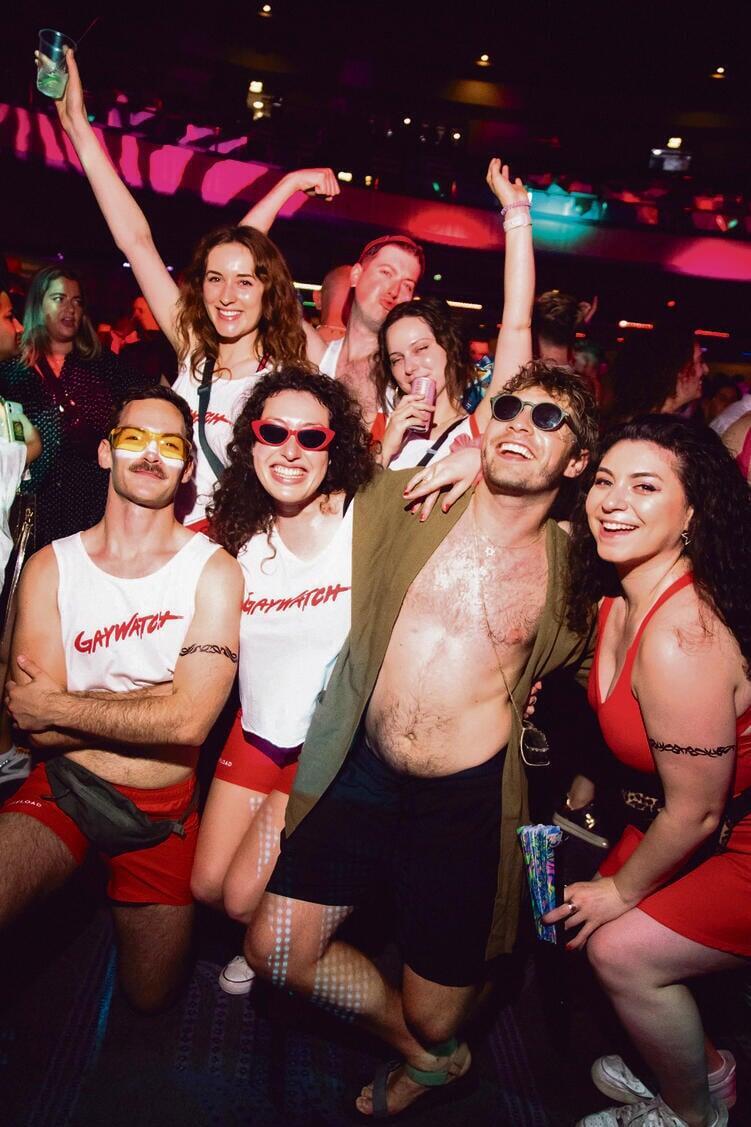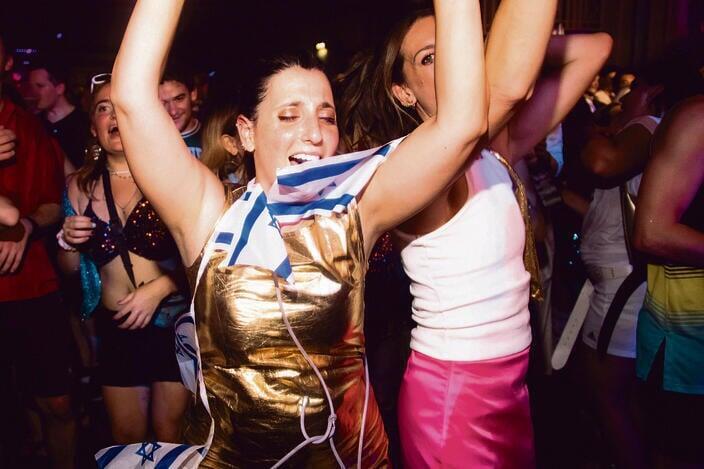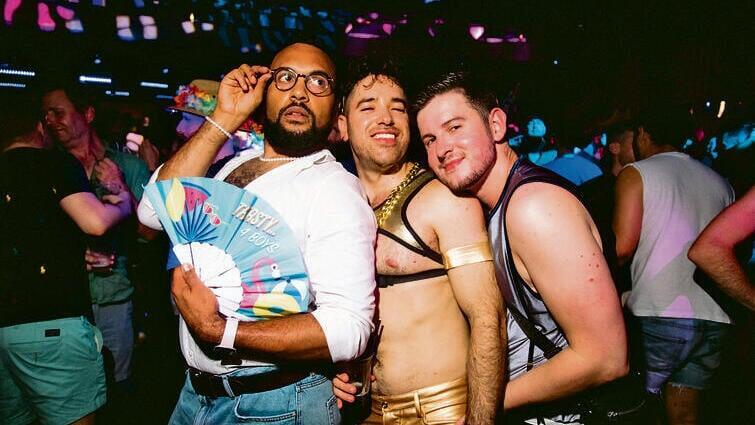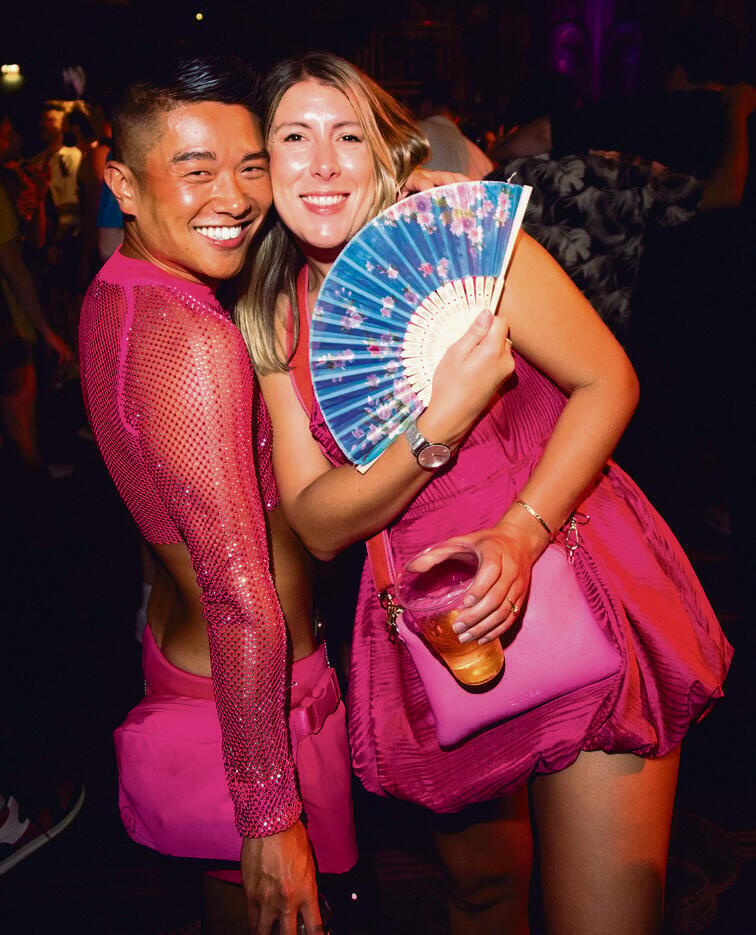Getting your Trinity Audio player ready...
During its 90 years of existence, the Troxy, a medium-sized cultural center that stands in the tough heart of East London, has seen everything that the capital of England has to offer in the worlds of underground and counterculture: from bands that try to reinvent the wheel (and some even succeeded) to MMA-style fights. But now, on a hot Saturday night in September, the Troxy is hosting an unusual event, even in its size, and it includes shirtless men blowing the shofar, distributing apples with honey to the crowd, and almost 2,000 people dancing in colorful (and sometimes minimal) clothing to the tunes of "Hava Nagila" and "Whoever believes is not afraid" by Eyal Golan.
More stories:
Welcome to ButtMitzvah, the party line that has been celebrating for several years one of the most colorful and joyful combinations imaginable, between queer culture and Jewish tradition. This is the place where you dance to hits by Lady Gaga and Kylie Minogue alongside Noa Kirel and Omar Adam, and a drag queen appears on stage performing "Our Father" and then moves on to "Unholy" by Sam Smith and Kim Peters.
On the screen are projected clips taken at weddings and ceremonies of ultra-conservative Hasidim alongside Dana International's Eurovision performance in which she won, and of course clips from "Yentl" starring Barbra Streisand and "Fiddler on the Roof" with the late Haim Topol. In the square you can see men and women from a variety of origins and identities. You don't even have to guess that for some this is a first meeting with the singing of "Moshiach (Messiah), Moshiach, Moshiach." According to the ecstasy, the white donkey can certainly start preparations.
At the entrance stands Matthew, part of the small team that worked on the production of the parties, which made a name for them in the queer community in England and abroad. In the absence of a shirt, the heat affects him a little less than the others, but besides the Star of David necklace, he also wears a prominent sign that says "Kosher honey" in English. Matthew has been taking part in the celebration since its first day, six years ago, back when it was held in a small bar in the Dalston neighborhood in the east of the city. "I’m from a traditionalist family, similar to the Conservative in America," he describes his background.
"First of all it’s fun and we love the night life. Besides, Bar and Bat Mitzvah, essentially, is something very camp and gay. We thought it’s a beautiful theme for a party," he explains.
"The ButtMitzvah presents the people a fun and joyful side of Jewish tradition, that everyone can be a part of. That’s why non-Jews are coming here. It’s an inclusive and uplifting space, and it’s also something Jewish that is cool."
"The ButtMitzvah presents the people a fun and joyful side of Jewish tradition, that everyone can be a part of. That’s why non-Jewsare coming here. It’s an inclusive and uplifting space, and it’s also something Jewish that is cool."
Henry, for example, is a black and non-Jewish man, and this is already his fifth ButtMitzvah. Next to him stands Christina, a black woman, for who who is her first time. "I heard it’s the queer party to be at," she says. "It’s very important to celebrate the intersections of our communities. Some of us are LGBTQ and Jewish and some of are Black and LGTBQ and it’s important to acknowledge the fact that we are not a monolithic community. We come from different places with different backgrounds, and it’s important to celebrate it," said Henry.
"The party has an educational aspect," adds Alex, a friend of Henry and Christina, who is also not Jewish but his partner is. "You are very welcome even if you are not Jewish. There’re many queer spaces who tell you ‘Everybody’s welcome’, but very few actually make you feel like that. I know the Jewish holidays from my partner, and we celebrate at home, but I have friends who learned about it here."
The Jewish community here faces antisemitism. Do you think that such events help the war against it?
"The fact that you are here definitely helps you to call out antisemitism when you see it. In general, these parties help you think deeply about stuff that allegedly doesn’t concern you," said Henry.
"It’s only good when non-Jews are coming to this event, and they can see how Judaism can be vital and happy," says Mike, a non-observant Jew, but this evening he is wearing a kippah. "I can’t imagine a non-Jew coming here and can’t see what a wonderful people we are."
To come out of the closet as a Jew
Toward midnight, a tall man takes the stage and presents the "mishpocha" of the ButtMitzvah. His name is Josh Cole, and by day he is a senior figure in the British television industry: head of the comedy department at the BBC studio. His resume includes work on series such as "Good Omens," "Trying" and "Black Ops," one of the biggest hits on the British screen in 2023. He worked with Phoebe Waller-Bridge even before she was discovered as a star. But now Cole is here under the hat of the father of the clan: the founder of the ButtMitzvah and who saw how the idea of finding a fun space to be gay, British and Jewish becomes a popular event for all these types of identities.
"We felt like we don’t have space. We felt outsiders in spaces of gays, Jewish and British. I felt that I need to hide my Jewishness. Sometimes I felt it’s harder to come out as Jewish than as gay, and our Judaism is something that we are quite quiet about in public, understandably since historically it wasn’t always safe to be Jewish, that wasn’t the case in Britain. The ButtMitzvah is an effort to turn all of this on its head," said Cole.
And the attempt was far more successful than expected, right from the first moment, in a small bar called Glory. "I thought it will be appealing to Jewish gays, but I didn’t think there will be so many of them," Cole recounts of the premiere party. "I thought we’ll be few, but many people didn’t manage to get inside. People stood four hours in the rain. And then, slowly, a very diverse crowd started to attend. Non-Jewish gays, Non-gays Jewish, men and women of all ages. ... People of other minorities give us very warm feedback. I think it’s because in the gay world everything is pretty generic. The ButtMitzvhah offers something completely different."
Cole, unsurprisingly for a Brit, uses an understatement: the ButtMitzvah is a wild Jewish cultural event in the best sense of the phrase, and on the other hand an unusual connection of the gay scene to a world where religion and its customs play a significant role. "The ButMitzvah is a new and radical expression of Jewishness. I believe its an event with cultural and historic importance. I don’t think that Judaism was ever celebrated like that. It’s something very positive. Bringing non-Jews is also inspiring for people who have lost their Jewish identity. I talk to people who had a Jewish grandmother and the ButtMitzvah has opened a door that was shut," he claimed.
On the other hand, Judaism has a conservative dimension, certainly when it comes to the gay community.
"I think it’s pretty clear that we respect the idea that the ButtMitzvah isn’t for everybody. Humor is an important part of the Jewish identity and comedy is also my background, and people understand that the party is a parodoxic and extreme take on Jewish identity."
What do your parents think about all this?
"My parents were here, and my mother came with her friends. We also had rabbis here. It’s a very warm and loving event. Of course, it’s also satirical, so people will say that it’s not allowed to be satirical about it. That’s ok . The ButtMitzvah welcomes everybody, but it’s understood it is not for everybody."
Respect to Noa Kirel
In his brilliant book "Jews Don't Count" (the documentary is available and is highly recommended), the comedian David Badiel analyzes the discrimination of the Jewish community in the politically correct discourse and devotes a considerable part to the Israeli angle, that is, the way in which criticism against Israel is mobilized to dwarf the problem of anti-Semitism. The ButtMitzvah party also touches on this tension: on the one hand, a party where bagels and an apple with honey are handed out at the entrance, "Hava Nagila" is danced and the whole theme is Rosh Hashanah is first and foremost Jewish. On the other hand, the resurgence of Israeli pop in recent years is well represented on the square, and Noa Kirel would have been welcomed at this party like King Charles and even beyond.
According to Cole, the Israeli influence on the ButtMitzvah stems from a close familiarity with an unusual Israeli phenomenon: the transformation of Pride month in Tel Aviv into one of the peak events of global queer culture, as well as the "Arisa" parties, which connect the LGBT community with the Mizrahi identity (and gave birth to the institution of Pride hits such as "Tel Aviv" by Omer Adam and "Queen of the Roses" by Eden Ben Zaken).
"The Arisa parties blew my mind. They have a very big influence over the ButtMitzvah. I’m happy that there’s a brilliant and sharp music scene in Israel. I was very happy when Noa Kirell got through to an international audience," said Mathew.
So maybe the ButtMitzvah will make aliyah
"That’s a good question. We already had a party in New York, and it was translated pretty well. We would love to that in Israel, but a big part of the party’s humor concerns the British lifestyle, and even in New York we had to adjust. So friends from Tel Aviv tell us that we should come, and we would be happy to since many of us are travel every year to Pride in Tel Aviv. So maybe, we’ll see."
Cole does not rule out the idea either, but he too is afraid that everything that looks cute and cool in East London will not work as well in Tel Aviv. And he has another problem: "I would love to do the ButtMitzvah in other places, but the truth is that I don’t have time."
By the way of your day job, there is a classic romantic comedy here: a Jewish gay and a non-Jewish gay meet at a ButtMitzvah and you won't believe what happened next.
(Laughs): "You are right. You can do many things with the ButtMitzvah, which is basically a very theatrical event. What we’re doing right now also works great."
The Jewish side of London
Other recommendations for those who want to experience some Judaism in the British capital:
• A tour of the old Jewish quarter. London is full of wonderful and enriching walking tours, and one of them (from the London Walks company) is dedicated to a relatively hidden gem: the history of the old Jewish quarter in the east of the city, which stretches from the Tower subway station to the moving statue in memory of the Kindertransport children. Held every Sunday at 10:15 a.m., book in advance on the website.
• Sukkot in the zoo. The famous London Zoo, not a bad attraction in the west of the city for families, will celebrate Sukkot for the first time this year and will set up a sukkah in a place that will serve visitors who want to sit in the shade and also enjoy kosher food (for a fee).
• Rinkauf bakery. Hyman Reinkoff immigrated to London from Kiev with a dream to open a bakery. In 1911, he fulfilled his wish and it continues to exist more than a century later with bagels of many kinds, an excellent babka cake and great challah. 224 Jubilee Street.





